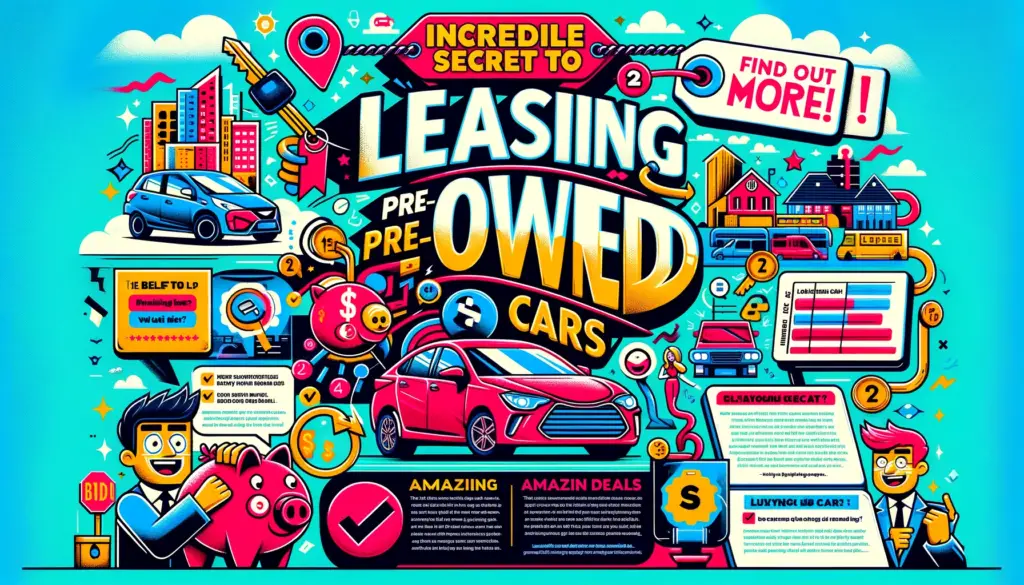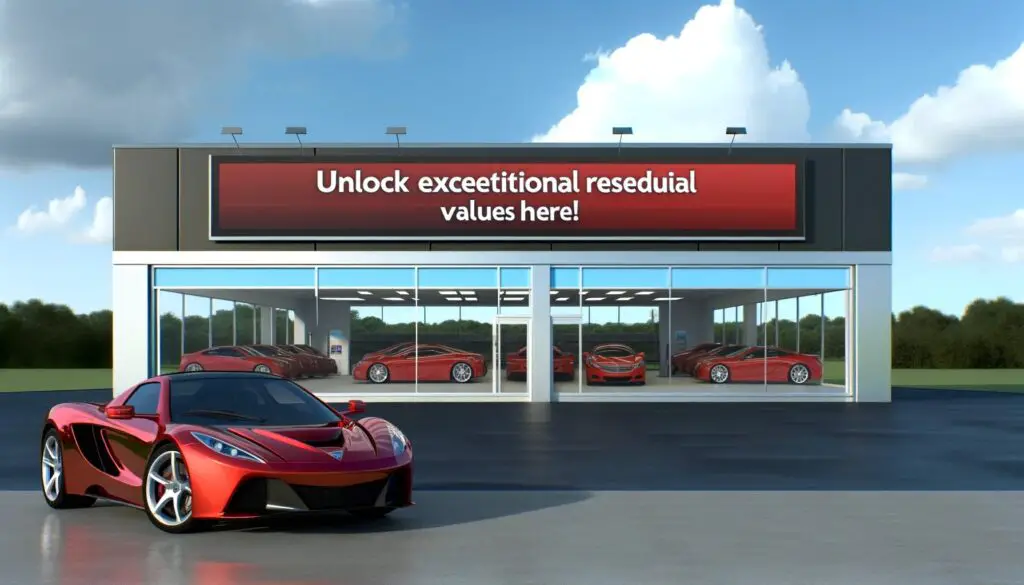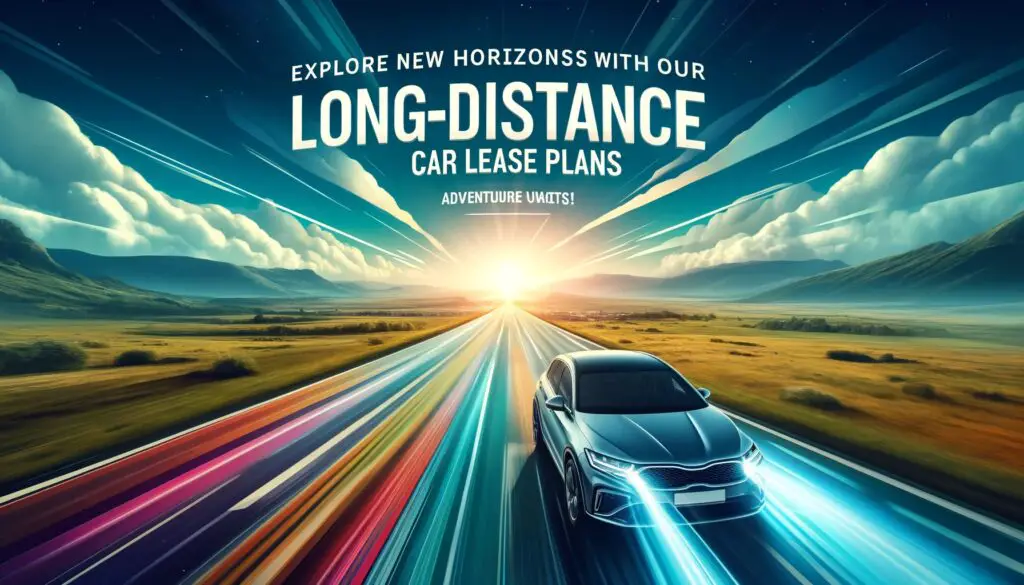In today’s fast-paced world, owning a car has become a necessity for many. However, the decision between leasing a pre-owned car and buying a new one can be a daunting one. To shed light on this topic, we’ve prepared an informative guide that explores the advantages and disadvantages of leasing a pre-owned car. By the end of this article, you’ll have a clear understanding of whether leasing a pre-owned car is the right choice for you.
I. Introduction
A. Why Consider Leasing a Pre-Owned Car?
Leasing a pre-owned car is a practical choice that offers numerous advantages, making it a compelling option for individuals who seek the benefits of a vehicle without committing to long-term ownership. Let’s explore why you should consider leasing a pre-owned car:
1. Flexibility in Your Vehicle Choices
When you opt for a pre-owned car lease, you gain the flexibility to choose from a wide range of vehicles. This flexibility extends beyond the constraints of buying a brand-new car. Here’s why it matters:
a. Access to Varied Makes and Models
Leasing a pre-owned car allows you to explore a diverse selection of makes and models that might be outside your budget if you were purchasing a new vehicle. Whether you desire a compact sedan, a spacious SUV, or a high-performance sports car, the options are extensive.
b. Stay Current with Trends
Leasing enables you to stay up-to-date with the latest automotive trends and technologies. As new models are released each year, you can easily transition to a different pre-owned vehicle at the end of your lease, keeping you in the driver’s seat of innovation.
2. Lower Monthly Payments
One of the most appealing aspects of leasing a pre-owned car is the substantially lower monthly payments compared to buying a new vehicle. This financial advantage can have a significant impact on your budget:
a. Depreciation Advantage
New cars experience the steepest depreciation in their first few years. When you lease a pre-owned vehicle, you primarily cover the depreciation that has already occurred. As a result, your monthly payments are considerably lower than if you were financing a new car.
b. Ideal for Budget-Conscious Drivers
For individuals who are budget-conscious, leasing a pre-owned car provides an attractive solution. It allows you to enjoy the experience of driving a quality vehicle without the financial strain associated with purchasing a brand-new car.
B. Overview of the Pros and Cons of Leasing Pre-Owned Vehicles
Leasing pre-owned vehicles is not without its pros and cons. To help you make an informed decision, we’ll delve into these factors in detail, providing an in-depth analysis of the advantages and disadvantages of choosing this path.
The Advantages of Leasing Pre-Owned Vehicles
Leasing a pre-owned car comes with several distinct advantages that make it a compelling choice for many individuals:
1. Lower Upfront Costs
When you lease a pre-owned car, you typically have lower upfront costs compared to buying a new vehicle. This means you may need less money for a down payment or can allocate your resources elsewhere.
2. Warranty Coverage
Many pre-owned cars offered for lease are certified pre-owned (CPO), which means they have undergone rigorous inspections and come with extended warranties. This provides peace of mind, knowing that you’re covered for unexpected repairs.
3. Reduced Maintenance Expenses
As pre-owned cars have already endured some depreciation, they often require fewer maintenance expenses. This can lead to long-term savings, as you won’t be responsible for costly repairs that new car owners might face.
4. No Long-Term Commitment
Leasing a pre-owned car typically involves shorter lease terms compared to financing a new vehicle. This means you can enjoy the benefits of a car without being tied down to it for an extended period.
The Disadvantages of Leasing Pre-Owned Vehicles
While leasing pre-owned vehicles has its merits, it’s essential to consider the potential drawbacks:
1. Mileage Restrictions
Lease agreements typically come with mileage restrictions, and exceeding these limits can result in additional fees. It’s crucial to assess whether these restrictions align with your driving habits.
2. Early Termination Fees
Ending a lease prematurely can lead to substantial financial penalties. It’s essential to understand these consequences before making a decision.
3. You Don’t Own the Car
It’s important to remember that when you lease a pre-owned car, you won’t own the vehicle at the end of the lease term. You’ll need to decide whether you want to lease another vehicle or explore alternative options.
In summary, leasing a pre-owned car offers distinct advantages, such as flexibility in vehicle choices and lower monthly payments. However, it’s essential to consider the potential drawbacks, including mileage restrictions, early termination fees, and the non-ownership aspect. By weighing these factors carefully, you can determine whether leasing a pre-owned car aligns with your needs and preferences.
II. Pros of Leasing a Pre-Owned Car
When it comes to leasing a pre-owned car, there are several compelling advantages that make it an appealing choice. In this section, we will explore these advantages in-depth, providing you with a comprehensive understanding of the benefits of opting for a pre-owned car lease.
A. Lower Monthly Payments
1. Explaining the Depreciation Advantage
One of the most significant advantages of leasing a pre-owned car is the considerably lower monthly payments compared to purchasing a brand-new vehicle. This financial benefit can be attributed to the concept of covering depreciation during the lease term.
a. Understanding Depreciation
Depreciation is the decline in a vehicle’s value over time. It is most pronounced during the initial years of a car’s life. When you lease a pre-owned car, you are essentially renting it for a specified period, typically two to three years. During this lease term, you are responsible for the depreciation that occurs over that period, rather than the entire vehicle’s value.
b. Reduced Monthly Costs
As pre-owned cars have already undergone the steepest depreciation, your monthly lease payments are significantly reduced. This means you can enjoy the benefits of driving a quality vehicle without the financial burden of financing a new car’s higher depreciation costs.
2. Affordability for Budget-Conscious Drivers
For individuals who prioritize financial prudence, leasing a pre-owned car is an attractive option. The lower monthly payments make it feasible to drive a reliable vehicle without straining your finances.
B. Wider Variety of Cars
1. Access to Luxury and Performance Models
Leasing a pre-owned car opens doors to a wider variety of vehicles, including luxury and high-performance models. This expanded access to premium vehicles can be especially enticing if you have a preference for upscale or sporty cars.
a. Luxury Vehicles
Leasing a pre-owned luxury car allows you to experience the elegance and advanced features of high-end automotive brands. These cars often come with luxurious interiors, cutting-edge technology, and enhanced comfort.
b. Performance Models
If you have a penchant for high-performance vehicles, leasing a pre-owned sports car or performance-oriented model becomes a viable option. These cars deliver exhilarating driving experiences without the hefty price tag associated with buying new.
2. Expanding Options Within Budget Constraints
Even if you have a specific budget in mind, leasing a pre-owned car provides you with the flexibility to explore a broader range of options. This versatility is a significant advantage, particularly if you have specific preferences in mind.
a. Tailored to Your Budget
Lease terms can be tailored to align with your budgetary constraints. Whether you’re looking for an affordable compact car or a spacious SUV, there are pre-owned options available to suit your financial parameters.
b. Variety of Makes and Models
The pre-owned car market offers a vast array of makes and models, ensuring that you can find a vehicle that meets your lifestyle and functional requirements. This diverse selection allows you to choose a car that perfectly suits your needs.
C. No Trade-in Hassle
1. The Convenience of Returning the Car
At the conclusion of your lease term, you can enjoy the convenience of returning the pre-owned car to the dealership. This eliminates the need to engage in the often cumbersome process of selling or trading in a vehicle.
a. Streamlined Process
Returning a leased vehicle is a straightforward process. You hand the car back to the dealership, settle any outstanding fees, and have the option to lease a new pre-owned vehicle or explore other alternatives.
2. Eliminating the Need for Selling
Leasing a pre-owned car eliminates the uncertainties and potential hassles associated with selling a vehicle privately. This convenience can be a significant time-saver and reduce the stress often associated with selling a used car independently.
D. Potential Warranty Coverage
1. Highlighting Certified Pre-Owned (CPO) Benefits
Many pre-owned cars offered for lease are certified pre-owned (CPO), a designation that signifies rigorous inspections and extended warranty coverage. This certification provides peace of mind, knowing that you are protected against unexpected repair costs.
a. Rigorous Inspections
CPO vehicles undergo comprehensive inspections by certified technicians. These inspections cover various components and systems to ensure that the car meets high-quality standards.
b. Extended Warranty
The inclusion of an extended warranty with a CPO pre-owned car means that you won’t be burdened with unexpected repair expenses. This warranty coverage can translate into significant savings and provide a sense of security throughout your lease term.
In summary, leasing a pre-owned car offers a multitude of advantages, including lower monthly payments, access to a diverse selection of vehicles, the convenience of returning the car at the end of the lease, and potential warranty coverage. These benefits cater to budget-conscious drivers and individuals with specific vehicle preferences, making leasing a pre-owned car a compelling and financially prudent choice.
III. Cons of Leasing a Pre-Owned Car
A. Mileage Restrictions
1. Explanation of mileage limits
One of the drawbacks of leasing a pre-owned car is the mileage restrictions imposed by lease agreements. You’ll need to adhere to these limits, or else you may incur additional charges.
2. Discussing excess mileage fees
Excess mileage fees can add up quickly if you surpass the agreed-upon limits. It’s essential to carefully consider your driving habits and whether they align with the restrictions of a lease.
B. Early Termination Fees
1. Consequences of ending the lease prematurely
Leasing contracts typically come with fixed terms, and ending the lease early can result in substantial penalties. It’s crucial to understand these consequences before making a decision.
2. Financial implications of penalty fees
Early termination fees can have a significant financial impact, so it’s vital to evaluate your long-term commitment to the vehicle before signing a lease.
C. You Don’t Own the Car
1. Clarifying the end-of-lease options
When you lease a pre-owned car, it’s important to remember that you won’t own the vehicle at the end of the lease term. You’ll need to decide whether you want to lease another vehicle or explore alternative options.
2. Emphasizing the non-ownership aspect
Not owning the car means you won’t have an asset to sell or trade-in. This aspect may not align with everyone’s preferences.
IV. Things to Consider Before Leasing a Pre-Owned Car
Before you proceed with leasing a pre-owned car, there are several crucial factors to take into account. Making an informed decision involves considering your credit score, evaluating your driving habits, and assessing the condition of the vehicle you intend to lease.
A. Your Credit Score
1. How Credit Score Affects Lease Terms
Your credit score is a fundamental element that significantly influences the terms of your pre-owned car lease. It’s essential to understand how your credit score impacts the leasing conditions:
a. Leasing Eligibility
A higher credit score generally makes you a more attractive candidate for leasing. Lenders and dealerships often offer more favorable terms to individuals with excellent credit, including lower interest rates and more flexible lease agreements.
b. Lower Monthly Payments
A good credit score can lead to lower monthly lease payments. Lenders may be more willing to extend better financing terms to individuals with strong credit histories, resulting in reduced overall costs.
2. Importance of a Good Credit Score
Maintaining a good credit score is paramount if you aim to secure the best possible lease terms. Your credit score reflects your financial responsibility and creditworthiness, influencing the leasing process in the following ways:
a. Lower Interest Rates
A good credit score can lead to lower interest rates on your pre-owned car lease. This, in turn, can result in significant savings over the lease term.
b. Negotiating Power
With a solid credit score, you have more negotiating power when discussing lease terms with dealerships. You can leverage your creditworthiness to request more favorable conditions.
c. Lease Approval
A higher credit score increases your chances of lease approval. If your credit score is in good standing, dealerships are more likely to consider you a low-risk lessee.
In summary, your credit score plays a pivotal role in the leasing process, affecting your eligibility, interest rates, and overall lease costs. It’s crucial to maintain a good credit score or take steps to improve it if necessary before entering into a pre-owned car lease.
B. Your Driving Habits
1. Matching Lease Terms to Your Mileage Needs
When considering a pre-owned car lease, it’s vital to align the lease terms with your typical driving habits. Failing to do so can lead to excess mileage fees and other inconveniences:
a. Understanding Mileage Limits
Lease agreements typically specify mileage limits, such as 10,000, 12,000, or 15,000 miles per year. You must assess whether these limits match your anticipated mileage needs.
b. Avoiding Excess Mileage Fees
Exceeding the mileage limits set in your lease agreement can result in substantial excess mileage fees at the end of your lease. To avoid these charges, ensure that the lease terms align with your regular driving patterns.
2. Evaluating Suitability for Frequent Drivers
Your suitability for leasing a pre-owned car depends on your driving habits. If you are a frequent driver, leasing may not be the most cost-effective option, as it can lead to higher costs due to mileage restrictions:
a. Frequent Commuting
If you have a long daily commute or frequently travel long distances, the mileage limitations of a lease may pose challenges. You may find yourself consistently exceeding the allotted mileage, incurring additional charges.
b. Alternative Considerations
In cases where you anticipate high mileage usage, it may be more practical to explore alternatives to leasing, such as purchasing a pre-owned vehicle outright or considering a lease with higher mileage allowances.
C. The Car’s Condition
1. Ensuring Vehicle Reliability
Before committing to a pre-owned car lease, it is essential to ascertain the vehicle’s condition. You should take steps to ensure that the car is reliable and free from significant defects:
a. Requesting Inspections
Prior to finalizing the lease agreement, request comprehensive inspections of the pre-owned car. These inspections should cover various aspects of the vehicle, including its mechanical systems, safety features, and overall condition.
b. Reviewing Vehicle History Reports
Vehicle history reports provide valuable insights into the car’s maintenance history, accident records, and potential issues. Reviewing these reports can help you make an informed decision and provide peace of mind.
c. Addressing Concerns
If the inspections or history reports raise concerns about the car’s condition, discuss these issues with the dealership. It’s essential to resolve any outstanding matters before proceeding with the lease.
In conclusion, several critical considerations must be made before leasing a pre-owned car. Your credit score, driving habits, and the car’s condition all play significant roles in determining the suitability of a pre-owned car lease for your needs. By carefully evaluating these factors, you can make an informed decision that aligns with your preferences and ensures a smooth leasing experience.
V. Shopping for the Best Deal
When it comes to leasing a pre-owned car, securing the best possible deal is paramount. This section will guide you on how to navigate the process effectively, ensuring that you gather multiple quotes, compare interest rates, and evaluate lease terms comprehensively to make an informed decision.
A. Get Multiple Quotes
1. Importance of Shopping Around
To maximize your chances of securing an advantageous pre-owned car lease, it is imperative to cast a wide net by obtaining quotes from multiple dealerships. Here’s why this practice is essential:
a. Competitive Advantage
When you gather multiple quotes, you gain a competitive advantage. Dealerships are motivated to offer competitive terms when they know you are exploring other options.
b. Negotiation Leverage
Having multiple quotes in hand provides you with valuable negotiation leverage. You can use these quotes as leverage to negotiate more favorable terms with the dealership of your choice.
2. Gathering Quotes from Different Dealerships
To ensure that you have access to a range of pre-owned car lease options, it’s crucial to reach out to various dealerships. Expanding your search will give you a broader perspective on the available deals and enable you to make an informed decision.
a. Local Dealerships
Begin by contacting local dealerships in your area. They may have specific promotions or offers that cater to your preferences.
b. Online Inquiries
In the digital age, many dealerships provide online quote requests. Utilize these resources to gather quotes from dealerships beyond your immediate vicinity, increasing your chances of finding a competitive offer.
B. Compare Interest Rates and Terms
1. How Interest Rates Impact Your Lease
Interest rates are a critical component that can significantly influence the overall cost of your pre-owned car lease. Understanding the impact of interest rates is essential for making an informed financial decision:
a. Interest as Cost Factor
Interest is essentially the cost of borrowing the funds necessary for your lease. The higher the interest rate, the more you will pay over the life of the lease.
b. Impact on Monthly Payments
Interest rates directly affect your monthly lease payments. A lower interest rate can result in more manageable monthly costs, while a higher rate can increase your expenses.
2. Evaluating Lease Terms Comprehensively
While monthly payments are a crucial consideration, it’s essential not to focus solely on this aspect. To ensure that the lease aligns with your financial goals, evaluate the lease terms comprehensively:
a. Lease Duration
Consider the duration of the lease. Longer leases may offer lower monthly payments but could result in higher overall costs. Shorter leases may have higher monthly payments but lower total expenses.
b. Down Payment
Determine the required down payment. Some leases may require a substantial upfront payment, while others may offer low or zero down payment options.
c. Mileage Allowance
Review the mileage allowance included in the lease terms. Ensure that it matches your typical driving patterns to avoid excess mileage fees.
d. Additional Fees
Be aware of any additional fees, such as acquisition fees or disposition fees, associated with the lease. These fees can impact the overall affordability of the lease.
In summary, shopping for the best deal when leasing a pre-owned car involves obtaining multiple quotes, comparing interest rates, and evaluating lease terms comprehensively. By following these steps, you can make a well-informed decision that aligns with your budget and preferences. Remember that securing a competitive pre-owned car lease is achievable with careful research and negotiation.
VI. Additional Tips for Leasing a Pre-Owned Car
Leasing a pre-owned car can be a rewarding experience, but it’s essential to navigate the process wisely. In this section, we’ll provide you with additional tips to ensure a successful pre-owned car lease, including effective negotiation techniques, careful review of the lease agreement, and budgeting for maintenance costs.
A. Negotiate Lease Terms
1. The Art of Negotiation in Leasing
Negotiation is a valuable skill when it comes to leasing a pre-owned car. To secure the best possible lease terms, you should be prepared to engage in meaningful negotiations. Here’s how to approach this aspect of the leasing process:
a. Be Informed
Before entering negotiations, research current market trends, and have a clear understanding of your budget and requirements. This knowledge will empower you during discussions.
b. Discuss Key Factors
Engage in discussions about various critical elements of the lease, including:
– Price: Negotiate the overall cost of the pre-owned car, considering factors such as its age, mileage, and condition.
– Interest Rate: Explore the possibility of securing a lower interest rate, which can significantly impact your monthly payments.
– Mileage Limit: If the predetermined mileage limit does not align with your needs, negotiate for a higher allowance or explore alternatives.
2. Areas Open to Negotiation (Price, Interest Rate, Mileage Limit)
When negotiating a pre-owned car lease, several areas are open to negotiation. These include:
a. Price: The purchase price of the pre-owned car can often be negotiated. Dealerships may be willing to adjust the price to meet your budget.
b. Interest Rate: Negotiating a lower interest rate can lead to reduced overall lease costs. It’s worth exploring this option with the dealership or financial institution.
c. Mileage Limit: If the mileage limit set in the lease agreement does not align with your anticipated usage, negotiate for a higher mileage allowance or explore options for additional mileage.
B. Read the Lease Agreement Carefully
1. Avoiding Pitfalls by Understanding the Terms
Before you commit to a pre-owned car lease, it is crucial to thoroughly review the lease agreement. Failing to understand the terms can lead to unexpected surprises and challenges during the lease term. Here’s what to keep in mind:
a. Detailed Examination
Take the time to read the lease agreement meticulously. Pay close attention to clauses related to pricing, interest rates, mileage limits, and any additional fees.
b. Seek Legal Advice
If you find any terms or language in the lease agreement unclear or confusing, consider seeking legal advice. An attorney specializing in contracts can provide valuable insights and ensure you fully comprehend your obligations.
2. Ensuring Clarity Before Signing
Before putting your signature on the lease agreement, it is essential to seek clarity on any elements that may be ambiguous or require further explanation:
a. Lease Terms
Make sure you have a clear understanding of the lease duration, monthly payments, down payment requirements, and any penalties associated with early termination or excess mileage.
b. Additional Fees
Ask for a breakdown of all fees associated with the lease, including acquisition fees, disposition fees, and any other charges. Understanding these costs is essential for budgeting.
C. Budget for Maintenance Costs
1. Highlighting Routine Maintenance Responsibilities
While leasing a pre-owned car often includes warranty coverage, lessees are typically responsible for routine maintenance costs. It’s crucial to be aware of these responsibilities:
a. Maintenance Tasks
Routine maintenance tasks may include oil changes, tire rotations, brake inspections, and fluid replacements. These tasks are essential for the continued reliability and performance of the leased vehicle.
b. Warranty Coverage
Understand the extent of warranty coverage provided with the pre-owned car lease. Some maintenance may be covered, but it’s important to clarify which services are included.
2. Planning for Maintenance Expenses (Oil Changes, Tire Rotations)
To avoid unexpected financial burdens, it’s advisable to budget for maintenance expenses associated with your leased pre-owned car:
a. Create a Maintenance Budget
Estimate the costs of routine maintenance tasks over the course of your lease. This budget will help you set aside funds to cover these expenses when they arise.
b. Follow Manufacturer Guidelines
Adhere to the manufacturer’s recommended maintenance schedule. Proper upkeep not only ensures the vehicle’s reliability but also preserves its value.
In conclusion, these additional tips are essential for a successful pre-owned car lease experience. Effective negotiation skills, a thorough understanding of the lease agreement, and prudent budgeting for maintenance costs can help you make the most of your pre-owned car lease while minimizing unexpected challenges or expenses.
VII. Frequently Asked Questions (FAQs)
A. What are the main advantages of leasing a pre-owned car?
Leasing a pre-owned car offers lower monthly payments, access to a wider variety of cars, and potential warranty coverage, making it an attractive option for budget-conscious drivers.
B. How do I determine if leasing is right for my driving habits?
Consider your typical mileage and driving habits. If you stay within the mileage limits set by the lease and prefer flexibility, leasing may be a good fit.
C. Can I negotiate the terms of a pre-owned car lease?
Yes, negotiation is possible, and it’s advisable to explore areas like price, interest rate, and mileage limit to secure favorable terms.
D. What is the key difference between leasing and buying a pre-owned car?
The primary difference is ownership. When leasing, you don’t own the car, but you have the option to buy it at the end of the lease term.
E. Are there any tax benefits to leasing a pre-owned car?
Tax benefits may vary depending on your location and personal circumstances. Consult with a tax professional for specific advice.
F. What happens if I exceed the mileage limit on my leased pre-owned car?
Exceeding the mileage limit may result in additional fees. It’s important to monitor your mileage and plan accordingly.
G. Can I buy the pre-owned car at the end of the lease?
Yes, many leases offer the option to purchase the pre-owned car at a predetermined price at the end of the lease term.
H. Are there any special considerations for leasing luxury pre-owned cars?
Luxury pre-owned cars may come with higher lease payments, so it’s important to assess whether the added benefits align with your budget and preferences.
I. How do I ensure the pre-owned car I’m leasing is in good condition?
Request inspections and review vehicle history reports to ensure the pre-owned car is reliable and well-maintained.
J. Are there any additional costs besides monthly payments in a pre-owned car lease?
Yes, you may incur costs for excess mileage, early termination, and routine maintenance.
VIII. Conclusion
A. Summarizing the advantages and disadvantages of leasing a pre-owned car
In conclusion, leasing a pre-owned car offers lower monthly payments, a wider variety of vehicle options, and potential warranty coverage. However, it comes with mileage restrictions, early termination fees, and the non-ownership aspect.
Advantages of Leasing a Pre-Owned Car:
1. Lower Monthly Payments:
- Depreciation Advantage: When you lease a pre-owned car, your monthly payments are lower because you’re only covering the depreciation that occurs during the lease term. This is especially beneficial since pre-owned cars have already experienced their steepest depreciation.
2. Wider Variety of Vehicle Options:
- Access to Luxury and Performance Models: Leasing a pre-owned car opens doors to a broader range of vehicles, including luxury and high-performance models that might have been out of your budget if you were buying new.
- Expanding Options Within Budget Constraints: Even with a specific budget, leasing a pre-owned car allows you to explore a more extensive selection, catering to specific preferences.
3. Potential Warranty Coverage:
- Highlighting Certified Pre-Owned (CPO) Benefits: Many pre-owned cars available for lease are certified pre-owned (CPO). These vehicles undergo rigorous inspections and often come with extended warranties, providing peace of mind for potential repairs.
Disadvantages of Leasing a Pre-Owned Car:
1. Mileage Restrictions:
- Explanation of Mileage Limits: Lease agreements typically come with mileage limits, and exceeding these limits can result in costly excess mileage fees. This restriction may not suit individuals with high mileage needs.
2. Early Termination Fees:
- Consequences of Ending the Lease Prematurely: Terminating a lease before its agreed-upon term can result in substantial early termination fees, adding to the overall cost of the lease.
- Financial Implications of Penalty Fees: It’s essential to understand the financial implications of these penalty fees, which can impact your budget if unforeseen circumstances require you to end the lease early.
3. Non-Ownership Aspect:
- Clarifying the End-of-Lease Options: At the end of the lease, you won’t own the car. You’ll need to decide whether to return it, potentially lease a different vehicle, or explore other options.
- Consideration for Non-Ownership: Leasing means you won’t have the asset to sell or trade-in at the end of the term. For some, this non-ownership aspect might not align with their long-term goals.
In conclusion, leasing a pre-owned car offers various advantages, including lower monthly payments, access to a wider variety of vehicles, and potential warranty coverage. However, it’s essential to be aware of the associated disadvantages, such as mileage restrictions, early termination fees, and the non-ownership aspect. Your decision should align with your specific needs, driving habits, and financial considerations, making it essential to weigh these factors carefully before opting for a pre-owned car lease.
B. Encouragement to make an informed decision based on individual needs and circumstances
The decision between leasing a pre-owned car and buying one ultimately depends on your individual needs and circumstances. Consider your budget, driving habits, and preferences carefully before making a choice. By doing so, you can make an informed decision that aligns with your goals and priorities.





